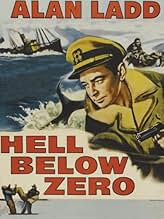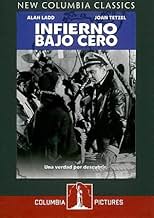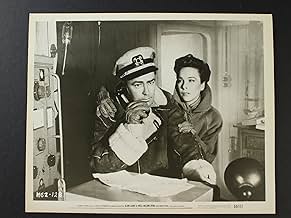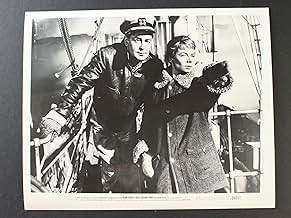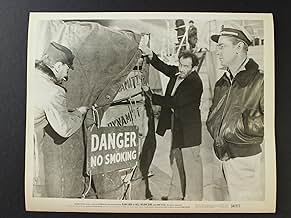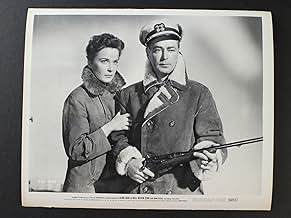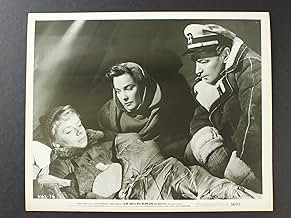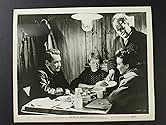IMDb RATING
5.8/10
598
YOUR RATING
The captain of an Antarctic whaling ship falls overboard in mysterious circumstances and his daughter, aided by a sympathetic American, decides to investigate the accident.The captain of an Antarctic whaling ship falls overboard in mysterious circumstances and his daughter, aided by a sympathetic American, decides to investigate the accident.The captain of an Antarctic whaling ship falls overboard in mysterious circumstances and his daughter, aided by a sympathetic American, decides to investigate the accident.
Featured reviews
This movie is better than the Maltin movie book rates it. Ladd does well with a poorly written role, Niall MacGinnis and Stanley Baker are fine too. The weak link is a plot that doesn't make sense and Joan Tetzel as a not very interesting love interest.
But a couple of other features push the movie up a notch. The beautiful color shots of whales being caught and slaughtered (in 1954! On a British ship!) are things you won't see elsewhere. I had no idea we were still killing whales on this scale at that time. Some scenes are right out of Moby Dick.
Another surprise is the role of a feisty whaling woman (played by Jill Bennett) captaining a whale catching vessel. You don't often see women in such action roles, even today.
And as others have noted, the mix of studio and arctic shots is pretty darn smooth. Much better than "Ice Station Zebra" for example. I was surprised and impressed.
So if you're an Alan Ladd fan, go ahead and catch this one. Or if you're curious about how they caught whales in the mid-twentieth century, this is better than any documentary.
But a couple of other features push the movie up a notch. The beautiful color shots of whales being caught and slaughtered (in 1954! On a British ship!) are things you won't see elsewhere. I had no idea we were still killing whales on this scale at that time. Some scenes are right out of Moby Dick.
Another surprise is the role of a feisty whaling woman (played by Jill Bennett) captaining a whale catching vessel. You don't often see women in such action roles, even today.
And as others have noted, the mix of studio and arctic shots is pretty darn smooth. Much better than "Ice Station Zebra" for example. I was surprised and impressed.
So if you're an Alan Ladd fan, go ahead and catch this one. Or if you're curious about how they caught whales in the mid-twentieth century, this is better than any documentary.
In the 21st century, this film is remarkable and valuable for one thing- as an archive of mid 20th century whaling, when the industrial killing was at its height. You will never again see so many blue whales together at one time. Pity they're all dead, next to the factory ship ready for processing. The whaling fleet was British (yes, we did that!). As a marine biologist I had seen many scenes of harpooning, but I had never seen the scenes of flensing and the industrial moving of such huge objects. I have never had a better illustration of the mass of a blue whale than when I saw it turned on the deck of the factory ship. Also, the blackboard chalking up what were presumably genuine daily scores for each whaleship was amazing. The attitudes of the leading characters at the successful capture of a blue whale were also stunning to see. If you have an interest in the whaling debate, see this film. I doubt there is a better film record of industrial whaling anywhere.
This British-made adventure represents an early teaming for two of the men who helped create the James Bond series, producer Albert Broccoli and writer Richard Maibaum. Apart from character names and the Arctic setting, the story doesn't really have much to do with the Hammond Innes novel on which it is (allegedly) based; the film actually ends more or less where the novel begins.
Nevertheless, this is gutsy, vital stuff with some vigorous action scenes and excellent location work. A young Stanley Baker makes a smooth, dangerous villain and the always-excellent Niall MacGinnis is on hand as a drunken doctor who comes to the aid of Alan Ladd's stoical, if slightly dull, hero.
Nevertheless, this is gutsy, vital stuff with some vigorous action scenes and excellent location work. A young Stanley Baker makes a smooth, dangerous villain and the always-excellent Niall MacGinnis is on hand as a drunken doctor who comes to the aid of Alan Ladd's stoical, if slightly dull, hero.
Hell Below Zero finds Alan Ladd as an American flying to Capetown to see about some mining investments. He meets Joan Tetzel on the plane and is intrigued by her. She's going there to investigate her father's death for herself, she doesn't like the initial verdict of suicide.
Ladd's investment has gone up in smoke and after he metes out a justified beat down to Peter Dyneley. He looks up Joan Tetzel at the Capetown equivalent of the Merchant Seaman's Hall. She's now half owner of a whaling vessel with Basil Sydney and his son, Stanley Baker and she's not happy with their explanation of things. On a flip of a coin since apparently Ladd has nothing else to do, he signs on their vessel as the first mate.
Though the personal story takes a melodramatic turn, I have got to hand it to the folks at Shepperton Studios. Other than using some establishing color cinematography to depict Capetown, the Ocean, the whaling, and the Antarctic, the film was shot in the United Kingdom. But you would never realize it, that's how good the sets are. There is a film Bear Island with Richard Widmark and Donald Sutherland that is also a polar location and that was done in North Labrador to simulate the Arctic. You can't tell the two apart, viewed side by side during the Antarctic sequences.
Best performance in the film however is Jill Esmond as a female Norwegian whaling ship captain, a part that is obviously a lesbian. Filmed today Jill's character would be quite open about her sexual orientation.
This is one of three British made films that Alan Ladd did for Columbia release in the USA during the Fifties. Hell Below Zero is easily the best of the three because of its production values. Very similar to the studio recreation of the Himalayas in Black Narcissus.
Ladd's investment has gone up in smoke and after he metes out a justified beat down to Peter Dyneley. He looks up Joan Tetzel at the Capetown equivalent of the Merchant Seaman's Hall. She's now half owner of a whaling vessel with Basil Sydney and his son, Stanley Baker and she's not happy with their explanation of things. On a flip of a coin since apparently Ladd has nothing else to do, he signs on their vessel as the first mate.
Though the personal story takes a melodramatic turn, I have got to hand it to the folks at Shepperton Studios. Other than using some establishing color cinematography to depict Capetown, the Ocean, the whaling, and the Antarctic, the film was shot in the United Kingdom. But you would never realize it, that's how good the sets are. There is a film Bear Island with Richard Widmark and Donald Sutherland that is also a polar location and that was done in North Labrador to simulate the Arctic. You can't tell the two apart, viewed side by side during the Antarctic sequences.
Best performance in the film however is Jill Esmond as a female Norwegian whaling ship captain, a part that is obviously a lesbian. Filmed today Jill's character would be quite open about her sexual orientation.
This is one of three British made films that Alan Ladd did for Columbia release in the USA during the Fifties. Hell Below Zero is easily the best of the three because of its production values. Very similar to the studio recreation of the Himalayas in Black Narcissus.
Duncan Craig and Judie Nordhall meet on a plane heading out to the Antarctic and win each other over during the flight. He has come for a business opportunity, she has come to disprove claims that her father, a whale ship captain, died by accident or by suicide she believes it was murder and intends to prove it. When his business deal goes bad Duncan signs up with Judie's ship as first mate to help her in her quest. The ship in question is owned by John Bland a hard man but nothing compared to his scheming son Erik, whom Duncan hears has had a hand in the death of Judie's father, a rumour that Duncan is very keen to quash.
Every inch the typical period adventure movie you expect it to be, this film opens with women in distress and a big strong man with a big wide chest there to help her in a big manly world of whaling. That it was this genre was no surprise but I had hoped it would be a good film rather than just being rather average and par for the course but sadly that is just what it was. The plot is fairly obvious and shuns logic and tension in favour of a more steady and predictable path that produces romance, stand-offs and the sort of fights where the bad guys line up with boxes raised just so that they can be hit by the hero and fall over. The characters seem to offer complex depths but unsurprisingly we stay on the surface of everything and really go nowhere with them as people. The story just about cuts it for a wet Saturday afternoon but don't expect any more than that.
What it does do well is use outdoor locations pretty well, although given that much of it is whale being cut up that may not be a good thing to everyone. The backdrops and sets are poor but the ice flows are convincing and bits of it do make the film stick in the mind but this is not enough to make it worth seeing for alone. The cast are actually outdone by the location use and most of them are too stiff to convince. Ladd does just what you expect and if that is enough for you then fine I accepted him as part of the genre. Tetzel is poor, failing to have chemistry Ladd, failing to produce a real person and being outdone by Bennett, who makes a much more interesting and energetic female role. Sydney is stiff but Baker is good and it is just a shame that he didn't have more screen time (or a character whose motivations made sense).
Overall this is a solid but average adventure yarn with nothing particularly remarkable to recommend it for. Perhaps the use of real whaling ships is of interest to some but everything else is by the numbers stuff that did enough to meet what I had been expecting but nothing more than that.
Every inch the typical period adventure movie you expect it to be, this film opens with women in distress and a big strong man with a big wide chest there to help her in a big manly world of whaling. That it was this genre was no surprise but I had hoped it would be a good film rather than just being rather average and par for the course but sadly that is just what it was. The plot is fairly obvious and shuns logic and tension in favour of a more steady and predictable path that produces romance, stand-offs and the sort of fights where the bad guys line up with boxes raised just so that they can be hit by the hero and fall over. The characters seem to offer complex depths but unsurprisingly we stay on the surface of everything and really go nowhere with them as people. The story just about cuts it for a wet Saturday afternoon but don't expect any more than that.
What it does do well is use outdoor locations pretty well, although given that much of it is whale being cut up that may not be a good thing to everyone. The backdrops and sets are poor but the ice flows are convincing and bits of it do make the film stick in the mind but this is not enough to make it worth seeing for alone. The cast are actually outdone by the location use and most of them are too stiff to convince. Ladd does just what you expect and if that is enough for you then fine I accepted him as part of the genre. Tetzel is poor, failing to have chemistry Ladd, failing to produce a real person and being outdone by Bennett, who makes a much more interesting and energetic female role. Sydney is stiff but Baker is good and it is just a shame that he didn't have more screen time (or a character whose motivations made sense).
Overall this is a solid but average adventure yarn with nothing particularly remarkable to recommend it for. Perhaps the use of real whaling ships is of interest to some but everything else is by the numbers stuff that did enough to meet what I had been expecting but nothing more than that.
Did you know
- TriviaAccording to director Mark Robson, Alan Ladd was a very unhappy man. During the shooting, he badly wounded his hand whilst he played football, but insisted on keeping working and not stopping the production of the film.
- GoofsWhen Eric falls into the sea at the end of the fight, the loose 'ice' is floating much too high, showing that it is actually expanded polystyrene.
- ConnectionsReferenced in The Exiles (1961)
Details
Box office
- Budget
- $1,000,000 (estimated)
- Runtime
- 1h 30m(90 min)
- Color
Contribute to this page
Suggest an edit or add missing content

